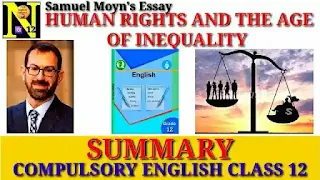 |
| Neb English Support Class 12 |
Section 2: Literature (Essays)
Human Rights and the Age of Inequality Summary | Samuel Moyn
Human Rights and the Age of Inequality
MAIN INTRODUCTION
Human Rights and the Age of Inequality Samuel Moyn
This essay "Human Rights and the Age of Inequality" was written by Samuel Moyn, an American writer. Here, the writer highlights the gap between the egalitarian crisis and the human rights remedy, arguing that they are inadequate. Samuel Moyn argues that the current human rights system is inadequate for addressing global inequality, suggesting that human rights demand not a subsitute but a suppliment. There is seen an additional aid only rather than a complete solution.
GLOSSARY
Human Rights and the Age of Inequality Samuel Moyn
parable (n.): a story told to illustrate a moral or spiritual truth
outstrip (v.): to become larger, more important, than sb/sth
ascendancy (n.): the position of having dominant power or control
destitution (n.): lack of sth
repression (n.): the action of forcing desires
generosity (n.): kindness
genocide (n.): the deliberate killing of a nation or race of people
egalitarianism (adj.): showing or holding a belief in equal rights, benefits and opportunities for everybody
preamble (n.): a statement or introduction that comes before sth spoken or written
enumenical (adj.): relating to, or representing the whole of a body churches
countercyclical (adj.): opposing the trend of a business or economic cycle
doppelganger (n.): alter ego
stigmatized (v.): to describe or consider sb/sth as sth very bad, worthy or of extreme disapproval, etc.
CLICK HERE 👇 TO READ
ALL ESSAYS IMPORTANT QUESTIONS' SOLUTION PACK
ABOUT THE WRITER
Human Rights and the Age of Inequality Samuel Moyn
Samuel Moyn is Jeremiah Smith, Jr. Professor of Law and Professor of History at Harvard University. In 2010, he published The Last Utopia: Human Rights in History, and his most recent book is Christian Human Rights. His areas of interest in legal scholarship include international law, human rights, the law of war, and legal thought, from both historical and current perspectives. In intellectual history, he has worked on a diverse range of subjects, especially twentieth-century European moral and political theory.
He has written several books in the fields of European intellectual history and human rights history. His book Not Enough: Human Rights in an Unequal World (2018) is his most recent work. He is currently working on a new book on the origins and significance of the humane war for Farrar, Straus, and Giroux. Over the years, he has written in venues such as the Boston Review, the Chronicle of Higher Education, Dissent, The Nation, The New Republic, the New York Times, and The Wall Street Journal.
MAIN SUMMARY
The essay "Human Rights and the Age of Inequality" by Samuel Moyn addresses the significant mismatch between the global egalitarian crisis and the human rights remedy, which he argues serves as a supplement rather than a substitute. He points out that the human rights regime and movement are not equipped to challenge global inequalities effectively.
The writer begins with a parable featuring Croesus, the last king of Lydia (reigned 560–546 BCE), whom Herodotus described as immensely wealthy and self-proclaimed the happiest of mortals. Croesus desired his citizens to be happy and free from suffering but was reluctant to invest his wealth to alleviate their plight. After his defeat, his possessions and wealth were seized by Persian king Cyrus the Great and his army.
Moyn links this historical scenario to the modern world, where inequality persists, and resources are unequally distributed. He notes that December 10 is celebrated annually as Human Rights Day, yet no substantial steps have been taken to ensure equal access to rights and property between the rich and poor globally. The only solution, distributive equality, is deemed nearly impossible in practical terms.
The writer compares the history of human rights with political economy, identifying two key stages: the heroic age of national welfare states after World War II, and the 1940s when political economy extended beyond national borders. Franklin Roosevelt’s famous 1944 "Second Bill of Rights" call for socio-economic security, made in his State of the Union address, missed three critical points: the late entry of a provincial U.S. into the North Atlantic consensus, the promise of freedom from want, and its vision of global equality.
Human rights weakened after the 1940s due to partisan divisions, splitting the world into democratic nations led by the U.S. and communist nations led by the USSR, triggering the Cold War. The post-war era’s global disintegration further hindered desired human rights progress, as states prioritized national welfare over egalitarian rights.
Moyn reflects on whether another human rights movement is necessary, drawing on Herodotus’s "Histories" to underscore the need for redistributing global socio-economic justice from the rich to the poor under pressure.
Although human rights activists argue that human rights documents claim and assure equal freedoms and rights for human beings, in reality, this does not apply in current real-life situations. Unless this current economy and socio-political structure exist, man will not have basic and useful freedoms and true rights. Thus, a fair share of the distribution of wealth and property from the rich to the poor, the redistribution of means and resources, the law-making and enforcement of the fair distribution of wealth by the government, and an egalitarian society require large-scale and radical movements. However, all of these are impractical, inappropriate, and very difficult to happen in reality.
Above all, our common destiny is like the world of Croesus, where the rich enjoy happiness, freedom, and everything to the maximum level, like the colonists in the British regime, while the poor live in a world of illusion with their floating equality and independence.
CLICK HERE 👇 TO READ
HUMAN RIGHTS AND THE AGE OF INEQUALITY EXERCISE CLASS 12 ENGLISH GUIDE
Post a Comment